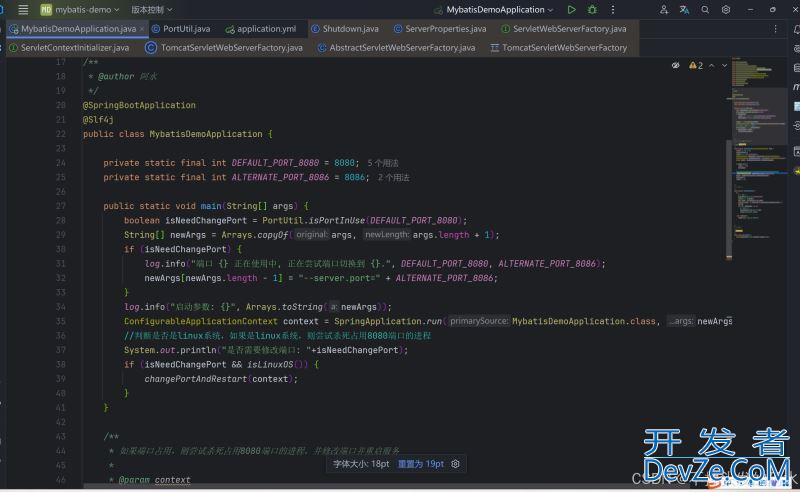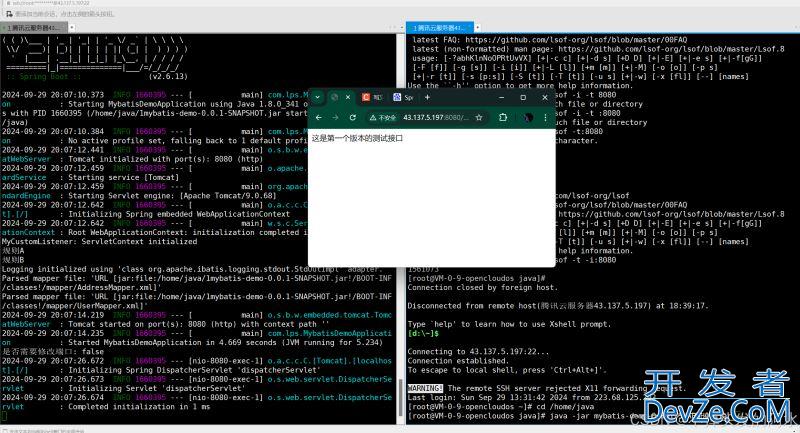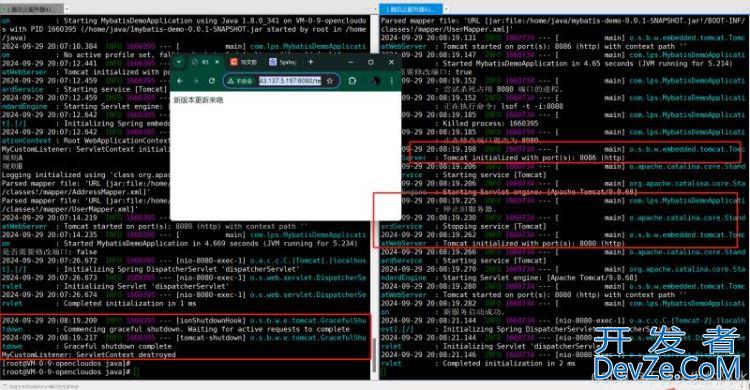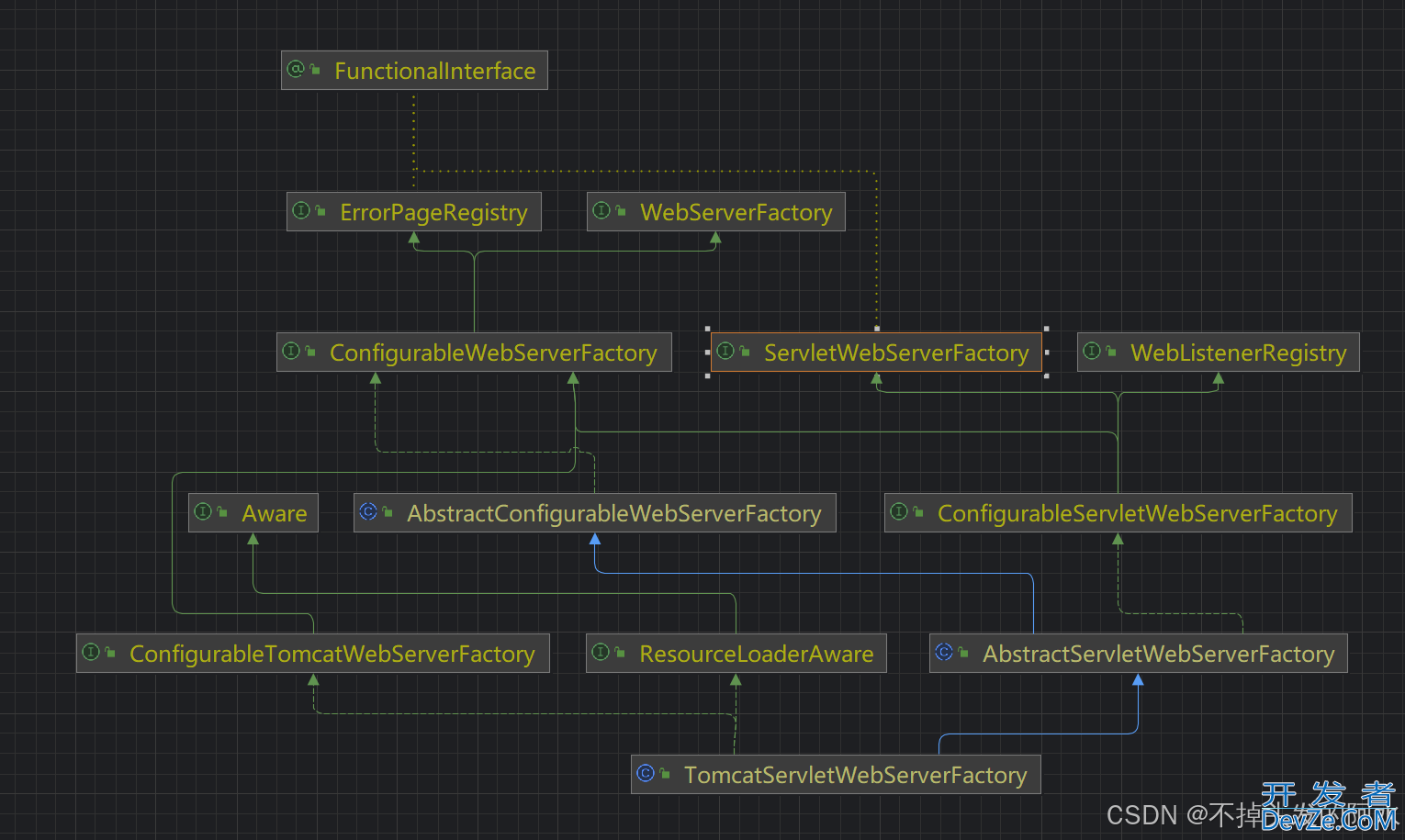SpringBoot项目请求不中断动态更新代码的实现
目录
- 1. 代码概述
- 完整代码
- 工具类
- 2. 主要功能
- 3. 代码实现
- 4. 配置优雅关闭
- 5. 小结
1. 代码概述
我们实现了一个简单的 Spring Boot 应用程序,它可以自动检测端口是否被占用,并在必要时切换到备用端口,然后再将目标端口程序关闭再将备用端口切换为目标端口。具体功能包括:
- 检查默认端口(8080)是否被占用。
- 如果被占用,自动切换到备用端口(8086)。
- 在 linux 系统下,优雅地关闭占用该端口的进程。
- 修改Tomcat端口并重启容器。
完整代码
import com.lps.utils.PortUtil;
import lombok.extern.slf4j.Slf4j;
import org.springframework.boot.SpringApplication;
import org.springframework.boot.autoconfigure.SpringBootApplication;
import org.springframework.boot.web.embedded.tomcat.TomcatServletWebServerFactory;
import org.springframework.boot.web.server.WebServer;
import org.springframework.boot.web.servlet.ServletContextInitializer;
import org.springframework.boot.web.servlet.server.ServletWebServerFactory;
import org.springframework.context.ConfigurableApplicationContext;
import Java.io.BufferedReader;
import java.io.IOException;
import java.io.InputStreamReader;
import java.util.Arrays;
/**
* @author 阿水
*/
@SpringBootApplication
@Slf4j
public class MyBATisDemoApplication {
private static final int DEFAULT_PORT_8080 = 8080;
private static final int ALTERNATE_PORT_8086 = 8086;
public static void main(String[] args) {
boolean isNeedChangePort = PortUtil.isPortInUse(DEFAULT_PORT_8080);
String[] newArgs = Arrays.copyOf(args, args.length + 1);
if (isNeedChangePort) {
log.info("端口 {} 正在使用中, 正在尝试端口切换到 {}.", DEFAULT_PORT_8080, ALTERNATE_PORT_8086);
newArgs[newArgs.length - 1] = "--server.port=" + ALTERNATE_PORT_8086;
}
log.info("启动参数: {}", Arrays.toString(newArgs));
//去除newArgs的nujyUykhill数据
newArgs = Arrays.stream(newArgs).filter(Objects::nonNull).toArray(String[]::new);
ConfigurableApplicationContext context = SpringApplication.run(MybatisDemoApplication.class, newArgs);
//判断是否是linux系统,如果是linux系统,则尝试杀死占用8080端口的进程
System.out.println("是否需要修改端口: "+isNeedChangePort);
if (isNeedChangePort && isLinuxOS()) {
changePortAndRestart(context);
}
}
/**
* 如果端口占用,则尝试杀死占用8080端口的进程,并修改端口并重启服务
*
* @param context
*/
private static void changePortAndRestart(ConfigurableApplicationContext context) {
log.info("尝试杀死占用 8080 端口的进程.");
killOldServiceInLinux();
log.info("正在修改端口更改为 {}.", DEFAULT_PORT_8080);
ServletWebServerFactory webServerFactory = context.getBean(ServletWebServerFactory.class);
ServletContextInitializer servletContextInitializer = context.getBean(ServletContextInitializer.class);
php WebServer webServer = webServerFactory.getWebServer(servletContextInitializer);
if (webServer != null) {
log.info("停止旧服务器.");
webServer.stop();
}
//((TomcatServletWebServerFactory) servletContextInitializer).setPort(DEFAULT_PORT_8080);
((TomcatServletWebServerFactory) webServerFactory).setPort(DEFAULT_PORT_8080);
webServer = webServerFactory.getWebServer(servletContextInitializer);
webServer.start();
log.info("新服务启动成功.");
}
/**
* 杀死占用 8080 端口的进程
*/
private static void killOldServiceInLinux() {
try {
// 查找占用 8080 端口的进程
Stri编程ng command = "lsof -t -i:" + DEFAULT_PORT_8080;
log.info("正在执行命令: {}", command);
Process process = Runtime.getRuntime().exec(command);
BufferedReader reader = new BufferedReader(new InputStreamReader(process.getInputStream()));
String pid;
while ((pid = reader.readLine()) != null) {
// 发送 SIGINT 信号以优雅关闭
Runtime.getRuntime().exec("kill -2 " + pid);
log.info("Killed process: {}", pid);
}
} catch (IOException e) {
log.error("Failed to stop old service", e);
}
}
/**
* 判断是否是linux系统
*
* @return
*/
private static boolean isLinuxOS() {
return System.getProperty("os.name").toLowerCase().contains("linux");
}
}
工具类
import java.io.IOException;
import java.net.ServerSocket;
/**
* @author 阿水
*/
public class PortUtil {
public static boolean isPortInUse(int port) {
try (ServerSocket ignored = new ServerSocket(port)) {
// 端口未被占用
return false;
} catch (IOException e) {
// 端口已被占用
return true;
}
}
}

测试效果


2. 主要功能
检测端口状态
通过 PortUtil.isPortInUse() 检查默认端口的使用状态。如果端口被占用,修改启动参数。
import java.io.IOException;
import java.net.ServerSocket;
/**
* @author 阿水
*/
public class PortUtil {
public static boolean isPortInUse(int port) {
try (ServerSocket ignored = new ServerSocket(port)) {
// 端口未被占用
return false;
} catch (IOException e) {
// 端口已被占用
return true;
}
}
}
修改启动参数
当发现端口被占用时,我们动态调整启动参数,以便在启动时使用新的端口。
if (isNeedChangePort) {
log.info("端口 {} 正在使用中, 正在尝试端口切换到 {}.", DEFAULT_PORT_8080, ALTERNATE_PORT_8086);
newArgs[newArgs.length - 1] = "--server.port=" + ALTERNATE_PORT_8086;
}
优雅关闭
在 Linux 系统中,如果检测到端口被占用,调用 killOldServiceInLinux() 方法,优雅地关闭占用该端口的进程。这是通过发送 SIGINT 信号实现的,允许应用程序进行清理工作并优雅退出。
/**
* 杀死占用 8080 端口的进程
*/
private static void killOldServiceInLinux() {
try {
// 查找占用 8080 端口的进程
String command = "lsof -t -i:" + DEFAULT_PORT_8080;
log.info("正在执行命令: {}", command);
Process process = Runtime.getRuntime().exec(command);
BufferedReader reader = new BufferedReader(new InputStreamReader(process.getInputStream()));
编程客栈 String pid;
while ((pid = reader.readLine()) != null) {
// 发送 SIGINT 信号以优雅关闭
Runtime.getRuntime().exec("kill -2 " + pid);
log.info("Killed process: {}", pid);
}
} catch (IOException e) {
log.error("Failed to stop old service", e);
}
}
3. 代码实现
代码的核心逻辑在 changePortAndRestart() 方法中实现,主要步骤包括停止当前 Web 服务器并重启。
/**
* 如果端口占用,则尝试杀死占用8080端口的进程,并修改端口并重启服务
*
* @param context
*/
private static void changePortAndRestart(ConfigurableApplicationContext context) {
log.info("尝试杀死占用 8080 端口的进程.");
killOldServiceInLinux();
log.info("正在修改端口更改为 {}.", DEFAULT_PORT_8080);
ServletWebServerFactory webServerFactory = context.getBean(ServletWebServerFactory.class);
ServletContextInitializer servletContextInitializer = context.getBean(ServletContextInitializer.class);
WebServer webServer = webServerFactory.getWebServer(servletContextInitializer);
if (webServer != null) {
log.infowww.devze.com("停止旧服务器.");
webServer.stop();
}
//((TomcatServletWebServerFactory) servletContextInitializer).setPort(DEFAULT_PORT_8080);
((TomcatServletWebServerFactory) webServerFactory).setPort(DEFAULT_PORT_8080);
webServer = webServerFactory.getWebServer(servletContextInitializer);
webServer.start();
log.info("新服务启动成功.");
}


4. 配置优雅关闭
在 application.yml 中设置优雅关闭:
server: shutdown: graceful
这个配置允许 Spring Boot 在接收到关闭请求时,等待当前请求完成后再停止服务。 (因此代码使用的是kill -2命令)

5. 小结
通过以上实现,我们能够灵活应对端口占用问题,并提升开发效率。热部署功能不仅依赖于 Spring Boot 提供的丰富 API,还需要结合操作系统特性,以确保在生产环境中的稳定性和可用性。
附带Window关闭端口程序代码
(Window关闭程序后可能得需要sleep一下,不然还会显示端口占用)
private static void killOldServiceInWindows() {
try {
// 查找占用 8080 端口的进程 ID
ProcessBuilder builder = new ProcessBuilder("cmd.exe", "/c", "netstat -ano | findstr :8080");
Process process = builder.start();
BufferedReader reader = new BufferedReader(new InputStreamReader(process.getInputStream()));
String line;
while ((line = reader.readLine()) != null) {
String[] parts = line.trim().split("\\s+");
if (parts.length > 4) {
String pid = parts[parts.length - 1];
// 杀死该进程
Runtime.getRuntime().exec("taskkill /F /PID " + pid);
log.info("Killed process: {}", pid);
}
}
} catch (IOException e) {
log.error("Failed to stop old service", e);
}
}
以上就是SpringBoot项目请求不中断动态更新代码的实现的详细内容,更多关于SpringBoot不中断更新代码的资料请关注编程客栈(www.devze.com)其它相关文章!







 加载中,请稍侯......
加载中,请稍侯......
精彩评论